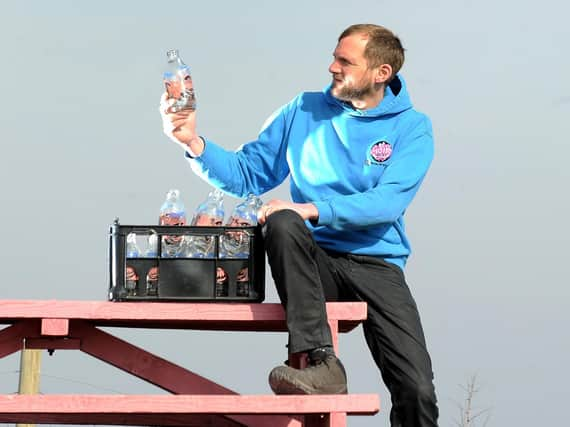Sheffield dairy farm champions the rising trend for glass milk bottles


This is where Eddie Andrew, his parents, Graham and Thelma, and Eddie’s brother, Dan, combinedly run the farm, dairy and retail enterprise that Eddie’s grandfather, Hector, started with 10 dairy cows, delivering milk by horse and cart in 1947.
Today the dairy herd runs to 90 cows and the farm 180 acres without a flat field in sight. Graham runs the farm, Dan the dairy and Eddie the wholesale business and ice cream enterprise with a small fleet of milk floats and seven-tonne refrigerated vans delivering fresh dairy produce to Sheffield’s residents every day – the past few weeks have been, as for everyone in the food chain, unprecedented.
Advertisement
Hide AdAdvertisement
Hide Ad“Morrisons rang for us to send everything we had, and the Co-operative tried to place an order for 22,000 litres to plug the gaps on their shelves,” says Eddie.
“We can produce 40,000 litres a week maximum through our dairy, and that’s using all our cows’ milk and milk from our two neighbours, who came in with us when we built it to be able to have milk from 300 cows.
Last night (Thursday, March 19) we had orders come in for 3,000 litres more than we would ever get from the cows.”
Laying aside the current panic buying there are wider messages that Eddie is receiving over milk buying habits and how the future of the fresh milk industry in the UK was already heading, but may now see an acceleration.
Advertisement
Hide AdAdvertisement
Hide Ad“We have been filling glass bottles at Cliffe House for 71 years. It’s not a new thing, even though there are those who might see it that way. Glass bottle sales had been declining ever since plastic came along. When we put in the new dairy three years ago we only put a machine in for bottling 10 at a time, putting foil lids on by hand.
“That’s how confident we were that glass wasn’t going to last much longer.
“The telling signs that glass was back came when we began offering new customers milk in a poly bottle, a bit cheaper than in glass, and nobody swapped! It was overwhelming. They wanted glass.”
Blue Planet II then hit the TV screens with a memorable final programme that showed the impact of plastic pollution and how it was affecting marine life.
Advertisement
Hide AdAdvertisement
Hide Ad“That’s when everyone woke up and became suddenly concerned about plastic and what happens to it next. We could all see that nothing happens, there isn’t much of a plan for plastic waste.
“We already sold milk to both Sheffield universities and being so close to Sheffield University in our business relationship led us to work with them on an LCA (Life Cycle Analysis) on glass versus plastic from the moment either type of bottle is made to filling, transporting and recycling or rewashing to the end of its life.
“Using present data a glass bottle has to be used 13 times to have a lower carbon impact than plastic, so if people aren’t going to give their glass back via putting it on their doorstep for the milkman or bringing it back to where it is purchased there is an argument for better off buying plastic, but the problems highlighted by Blue Planet II would then be exacerbated as the plastic eventually ends up somewhere.
“That’s why, along with the energy cost in making each glass bottle, there is a responsibility for making sure it is continually returned.”
Advertisement
Hide AdAdvertisement
Hide AdThe story of glass bottles far outweighs the plastic story. Glass bottles survive, are washed, cleaned and are reused. It is one of the best examples of sustainability in the food chain.
“23 years ago Sheffield added an extra digit to its phone numbers,” says Eddie.
“We still have bottles without that extra digit in our system and an average glass bottle lifespan is at least five years old, which means it will have been used hundreds of times.
“This has now become a big thing. People feel they can do something that is helping the planet and together with the university we are helping people make the right decisions for the right reasons. Plastic is still there, but where glass was on the decline it now makes up close to 50 per cent of our fresh milk sale.
Advertisement
Hide AdAdvertisement
Hide Ad“We have been back selling milk in glass bottles at the Co-operative in Ecclesall Road for the past seven months and in that time 70 per cent of sales have gone from plastic to glass – customers are consistently bringing back their empties. People are loving it.
“Goodness knows why the Co-operative haven’t as yet rolled it out around the rest of their stores!
“Since the panic over coronavirus our doorstep sales have gone through the roof. We have massive rounds in suburbs near us of Stannington and Loxley and everyone wants glass bottles.”
And price is not an issue.
“People now value buying a product that is not in plastic. This whole thing that milk has to be as cheap as possible, it doesn’t.”
Vans that run off compressed natural gas, creating an even better carbon footprint through utilising methane is another development Eddie is seeking to add.